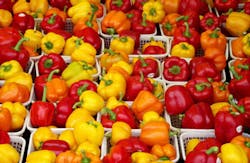TASMANIA — Fruit and vegetables are a vital part of people's lifestyles because of their health and nutrition benefits. That is why the fruit and vegetable market accounts for a significant proportion of the food manufacturing industry. However, the market is going through important changes, as freeze-dried and powdered vegetables are increasingly gaining popularity on a global level.
According to Sue Hinton, a vegetable industry development officer with the Tasmanian Institute of Agriculture in Australia, the industry is seeing rapid growth in advanced economies and this development calls for a more cooperative approach between farmers, food processors and retailers.
Growers thinking "out of the box" and adopting more flexible patterns of work that differ from the conventional practice of selling their produce to food processing companies and packing businesses could be key for the survival of the industry in a fiercely competitive environment, Hinton tells ABC Australia.
RELATED: Hostess Brands closes operations, lays off nearly 18,500 workers
One example of a successful cooperation between various parties involved can be seen in north-west Tasmania, near Sisters Creek. A group of farmers there put lower quality produce into use by slicing and dicing it and then packing it, whereas others dry their produce to provide for the expanding health food market.
Although Hinton says that co-operative may not be the best way to describe the process, as the term often has negative connotation; it really is an example of collaboration, having a common goal and trying to make the best of the new market opportunities available globally.
Food processing company Ranicar Pacific is one of those which operate on the health food market. It supplies vegetables from its factory in northern Tasmania and has recently achieved a four-fold increase in its production of freeze-dried vegetables. The company has also seen a significant rise in the amount of orders to the United States.
According to owner John Ranicar, production of powdered vegetables is the fastest growing industry at present. The company has a A$200,000 industrial freeze dryer, which allows processing of vegetables seven days a week. The owner hopes that in a few years the company might invest in more machines and increase production dramatically.
Ranicar says that at present there are five tons of vegetables to be powdered in about a month and a half until the end of the year and another 50 to 60 tons of beetroot alone planned for 2013. He explains that 50 tons of vegetables will translate into about five tons of powder, most of which will be intended for the U.S. market. Ranicar estimates that over the next year his company will process between 100 and 150 tons of fresh vegetables that will be turned into powder.
The business opportunities for Ranicar Pacific are provided by a business partner, which it supplies with vegetable produce. The Victoria-based company, called Super Sprout, has a well developed network in Asia and has recently started trading in the United States, Ranicar says. The majority of the exported product is used as a food supplement, added to a variety of foods, including smoothies, drink mixes and cakes.
